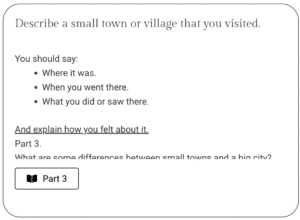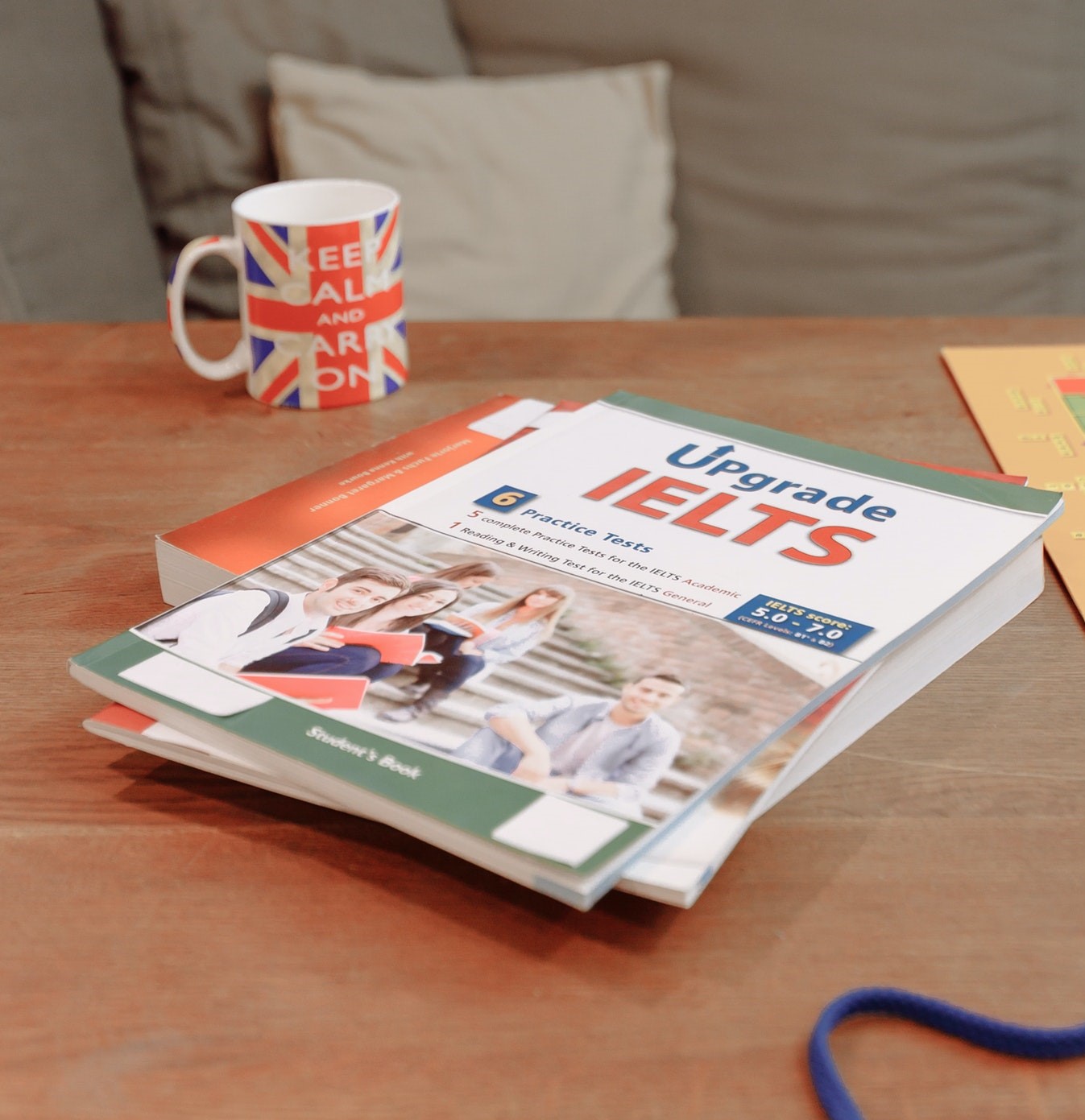Great idioms to describe places and travel
Idioms are what truly distinguish native English speakers from language learners, and they are inextricably linked to fluency. The correct use of idioms or idiomatic language in your IELTS speaking exam will indeed raise your band score. However it is important to be able to use them correctly, or you could end up with a lower band score. Idioms should not be learned as a list, but learned one at a time, and practiced in context.
The biggest mistakes students usually make while preparing idioms for the exam are learning lists of idioms, and then trying to fit them in inappropriately as they speak. Trust me when I tell you that the examiner will spot this and it will have a negative impact on your final band score.
To score a band 7 in your speaking exam it’s important to show at least some knowledge of using idioms, even if you do make some minor mistakes. To get a band 8 you should be able to use them with more confidence, making very few mistakes.
In the IELTS speaking exam, describing a place is a very common topic, especially in part 2. Even in part 1 you are often asked about your hometown, or the area you live in. It’s possible that you could get to use some of the idioms here to answer questions in the very first part 1 topic in your speaking exam.
- Is you hometown a big city or a smaller town?
- Where do you like to go in your hometown?
- Has your hometown changed in recent years?
- Is there anything you would like to change about your hometown?
 In part 2 of the IELTS speaking exam, there are always a number of topics to describe places, or trips.
In part 2 of the IELTS speaking exam, there are always a number of topics to describe places, or trips.
- Describe a small town or village you visited.
- Describe a cafe/coffee shop you like to go to.
- Describe a place you would like to visit.
- Describe a trip by car/motorcycle /bicycle you would like to take
- Describe a scenic place you visited.
Idioms for places
- Middle of nowhere
 This idiom is used to describe a place that is very remote, far from any city or town.
This idiom is used to describe a place that is very remote, far from any city or town.
“The little village was in the middle of nowhere so we had to travel the last part of the journey on foot..
- A stones throw
This idiom is describing how close a place is, as in it’s so close that you could throw a stone and reach it.
‘My favourite coffee shop is just a stones throw from my home.
- Cross that bridge when you come to it.
This is talking about a problem that we won’t worry about until we get to that particular problem.
Q“When you go abroad to study in Canada, how will you cope with the cold winters?
A“Don’t worry, I will cross that bridge when I come to it.
- To hit the road.
A very common idiom. This means to start a journey, or leave to go somewhere.
“It’s going to be a long journey tomorrow, so we need to hit the road early to get there on time
“My first class is at 7.30am everyday, so I need to get up early and hit the road..
- To live it up
 To really enjoy, and perhaps spoil yourself while on holiday, and not worry about anything.
To really enjoy, and perhaps spoil yourself while on holiday, and not worry about anything.
“While on holiday in Thailand, I stayed in the best hotels, and ate at the best restaurants. I really lived it up.
- On a shoestring
This idiom is like the opposite to the last one, and means to do something with a very small budget, and have little money to spend.
“I spent 3 months travelling around Europe on a shoestring. I slept on the trains as I travelled, and ate very simple food.
“As I’m a student, I have to try and live off a shoestring budget every month, and can’t actually afford to go to the cinema so often.
- Off the beaten track
 This idiom relates to a place that is a little remote, and far from where many people live. Very often used to describe a place worth visiting that is less touristy due to its location.
This idiom relates to a place that is a little remote, and far from where many people live. Very often used to describe a place worth visiting that is less touristy due to its location.
“I find that many tourist sites are just too busy and crowded, so I prefer to visit places that are off the beaten track.
- Break the journey
This idiom just means to stop somewhere along your journey, and take a rest of break.
“We stopped at a lovely little roadside cafe to have something to eat, and break the journey.
- To call it a day/night
When we call it a day/night, it means we have decided to stop doing whatever it was we were doing.
“After spending over 5 hours exploring the town in the hot sun, we decided to call it a day and hit the road back to the hotel.
Wow! See what I did there? I used 2 idioms in my answer!
- Hustle and bustle
 To describe a place, usually a big city that is too crowded and busy.
To describe a place, usually a big city that is too crowded and busy.
“I really enjoyed my time staying in this beautiful small village, as I was able to escape the hustle and bustle of the city I live in.
Adjectives used to describe places.
In your IELTS speaking exam you really should be using a wide range of adjectives, when describing anything. Good adjectives add colour and interesting details in any answer.
Lively/vibrant
“Although, a little off the beaten track, the old part of the city has some really lively and vibrant markets, where you can find some great souvenirs on a shoestring.
Wow! I think the IELTS examiner might be impressed with the idiomatic use of language in that answer.
- Picturesque
To describe a beautiful place that will look great in some photos.(Like the kind of picture you often see on a postcard)
“This charming little town was so picturesque, and I remember I took lots of selfies to post on my facebook page.
- Overrated/Underrated
You could describe a place as overrated if you believe it’s not as good as everyone had said.
“The beach was actually not clean, extremely crowded, and I think it’s actually very overrated.
“After reading great reviews for that restaurant online, I was very disappointed, and it’s definitely an overrated restaurant.
- Secluded
A place or area that is away from too many people, as is usually quiet and peaceful.
“Rather than going to the popular beaches close to the city, I prefer to try and find a nice secluded beach, away from the hustle and bustle.
- Unspoiled.
This can be used to describe a place that has not been spoiled by development, or heavy tourism. Very often a place of natural beauty.
“About 30km out of the city, off the beaten track, there is a very beautiful and secluded beach, which is still totally unspoiled.
Wow! Can you now see how we can and do use so many adjectives and idioms as we speak like a native speaker.
- Touristy
To describe a place that actually has too many tourists, and has lost its charm. It’s also probably expensive and spoiled by too much tourism development.
“It’s a beautiful old town, but at this time of year it’s just too touristy, and it’s hard to even walk on the streets without having to push your way through the crowds.
- Overdeveloped
This is like the opposite of unspoiled, and means a place that has spoiled and lost its charm, due to lots of big hotels and crowds.
“As a child I used to love visiting a small seaside town to the south of my hometown. However in recent years it has become overdeveloped, and is no longer unspoiled.
- Sprawling
Used to describe a big city which expands over a wide area.
“Shanghai is a huge sprawling city, and it can take up to 3 hours to go from one part of the city to another.
- Scenic
 To describe a place with beautiful natural scenery, or landscapes.
To describe a place with beautiful natural scenery, or landscapes.
“Although this little town is far off the beaten track, the journey there is incredibly scenic, and stopping to take some photos along the way is a great way to break the journey along the way
Summary
To use idioms in your IELTS speaking exam is a great thing to do, and of course will help to raise your fluency score. When using idioms in the exam, make sure you understand how to use it, and do not try inserting an idiom where maybe it doesn’t sound natural, or it’s out of context.
In the IELTS speaking exam there are always a lot of topics asking you to describe places, people, things and events, so you can narrow it down a little and concentrate on idiomatic language, as well as adjectives for these kinds of topics.
It’s never a good idea to try and learn a list of idioms, and you should just work on one or 2 at a time. Practice using them, making sentences and speaking into the mirror while doing so, and you will become more confident in using them. Make sure you really do understand the meaning and use of each idiom, and again do not try and just use a random idiom in a sentence thinking that it will impress the IELTS examiner. Idioms must be used correctly or instead of giving you a higher band score, will actually do more harm than good.
More idioms
IELTS speaking exam Idioms to describe people.
IELTS speaking exam Idioms for mood and feelings.
17 great idioms for discussing problems
38 great idioms for study and work



































